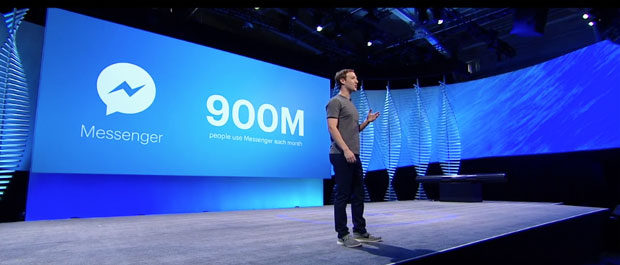Expanding on Facebook’s embrace of video and communication as a transformative tool, CEO Mark Zuckerberg on Tuesday launched the company’s new Messenger platform beta at its annual F8 conference for developers. The Messenger announcement was the first major initiative in the long-term vision he presented.
Zuckerberg outlined a major push to incorporate artificial intelligence and bots into the Messenger platform. The revamped service will allow companies and individuals to develop more sophisticated and personal experiences through Messenger than ever before, ultimately transforming the app into a major communications and marketing tool.
“Messenger is going to be the next big platform for sharing privately,” Zuckerberg told conference attendees.
More than 900 million people around the world and 50 million businesses use Messenger to communicate every month, he noted. Facebook already has started working with various businesses to help them build deeper relationships with their customers, and it now is opening up the platform to include bots and the send/receive API.
Video Takes the Wheel
We are entering the “golden age of online video,” Zuckerberg added, noting research findings that show Facebook users file 10 times more comments in response to video than to ordinary photos.
In some cases, public figures have been able to develop a bigger audience using video on Facebook than they attracted to their own television shows, he noted.
“Facebook is making a global push with messaging to make it a global platform and destination for all types of businesses,” said Brian Blau, a vice president at Gartner.
“With bots, they want to enable businesses to have a more direct and personal connect with their own customers,” he told TechNewsWorld, and with the use of “automated response and interaction technology, backed by deep learning and artificial intelligence, those bots will become very personal and human-like.”
Facebook can bring a number of new features to the table using the new Messenger bots, David Marcus, vice president of messaging products at Facebook, noted in a blog post.
The bots will be able to deliver a range of messages — from weather and traffic updates to customized receipts, shipping notifications, and live automated images specifically tailored to individual customers.
“Messenger API and the ability to integrate video and instant messaging into the social interaction will transform Facebook into a global telecommunications player,” Frost & Sullivan Research Manager Michael Jude told TechNewsWorld.
The Messenger send/receive API support will let developers and businesses build bots for Messenger. Facebook has developed Messenger codes, user names and links to help find people on Messenger, and to make it easier for people to find businesses.
“Using bots to power customer interaction allows businesses to scale to handle many customer issues without relying on large call centers,” Tirias Research Principal Analyst Kevin Krewell told TechNewsWorld.
Despite the ambitious plans, it may prove difficult for Facebook to get a large number of customers to switch from their existing messaging habits, suggested Rob Enderle, principal analyst at the Enderle Group.
“This is where Facebook’s lack of marketing skills will likely hurt their ability to make progress,” he told TechNewsWorld, “because they have to build demand for Messenger, and building demand currently isn’t one of their strengths.”
Facebook Spans the Globe
Zuckerberg also outlined a number of long-term initiatives to grow the company over the next decade, with one of the most ambitious being an effort to expand access to the Internet in the developing world. Nearly 4 billion people don’t have access to the Internet because they either lack the infrastructure or the ability to pay. In some cases, they have access to both but don’t see the urgency.
Facebook is developing lightweight, solar-powered aircraft that will be able to fly at 60,000 feet above the ground and provide high-speed Web access to population centers in Africa and other regions of the developing world. The aircraft, which has a wingspan wider than Boeing 737 — but weighs less than a car — can stay up in the sky for months at a time and beam Internet signals to the ground.
The company also has built a tool called “augmented traffic control,” part of an effort to help telecommunications companies provide Internet at an affordable price so that they can offer basic services for free. The initiative is already under way in 37 counties and reaches more than 30 million people.
Facebook’s Account Kit, another newly launched product, will help customers avoid a routine many hate — choosing usernames and passwords to sign up for websites. The tool will make it possible to use a single phone number or email, to be authenticated with a code.






















































